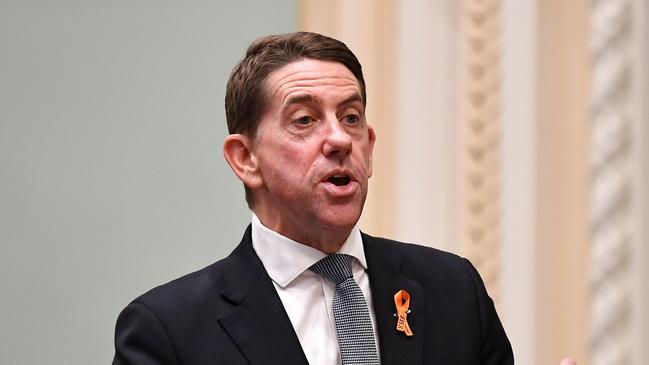Queensland coal industry wins decade of certainty
Queensland has paved the way for a potential expansion in the state’s coal industry by cementing rail and port monopolies for at least another decade.

Queensland Treasurer Cameron Dick has paved the way for a potential expansion of the state’s coal industry by cementing rail and port monopolies for at least another decade, helping to shield the industry from cost increases.
The move signals a major shift in the Palaszczuk government’s attitude to the politics of climate change, creating greater certainty for the state’s biggest export industry before a state election where it must hold several regional marginal seats to maintain government.
Less than a month after replacing Left faction leader Jacki Trad as Treasurer, Mr Dick quietly approved the continuation of rail and port infrastructure monopolies on which the coal industry relies, saying the decision would have no effect on emissions.
Mr Dick used the government gazette to declare decades-long extensions of regulatory monopolies for a huge rail network to transport coal from nearly 50 mines in central Queensland, and an export terminal facility near Mackay. He has also sought to head off another round of climate change litigation by environmental groups upset by the decision, saying the move “would not limit any of the human rights potentially relating to climate change”.
The decision delighted Queensland Resources Council chief executive Ian Macfarlane, who said it would give greater certainty to an industry that is worth $52bn a year to the state.
“It’s a big vote of confidence in the industry, and during these uncertain times this decision delivers certainty and supports further investment,” Mr Macfarlane said.
“Having the declaration in place ensures clarity for Queensland’s coal customers over potential costs being escalated by port or rail providers. Investors want certainty, and as a result we could see greater capacity come online with new coal projects.”
The decision is likely to be well received in central and northern Queensland, where the Labor government needs to retain key marginal seats to be returned at the October 31 state election and where federal Labor lost huge ground at last year’s federal election.
The 2670km central Queensland coal rail network is Australia’s largest and links more than 50 mines to five big export ports. Operated by Aurizon under a 99-year lease arrangement with the state, access to the monopoly network is regulated by the Queensland Competition Authority.
Mr Dick’s decision will mean these access arrangements will remain in place until at least 2040.
The Dalrymple Bay Coal Terminal at Hay Point near Mackay has been the export supply point for Bowen Basin coal since 1983. The Treasurer has extended the monopoly regulation for the terminal to 2030.
The appointment of Mr Dick, from Labor’s Right faction, as Treasurer has heralded a big change in the way the Palaszczuk government deals with matters regarding the coal industry.
A spokesman for the Treasurer declined to comment beyond what had been said in the 104-page decision published in the extraordinary gazette this week.
However, Mr Dick insists the move to extend the coal infrastructure monopolies will have no material effect on the volume of coal exported. “This will primarily depend on market factors such as demand and price,” he said.
His comments may head off moves by environmental groups to use Queensland’s new Human Rights Act to kick off a new round of climate change litigation. The Environmental Defender’s Office is spearheading a legal challenge to Clive Palmer’s proposed Waratah coalmine in the Galilee Basin, arguing decisions that may increase emissions may limit a range of rights — including the right to life and the right of children to protection that is in their best interests.
Mr Dick’s decision also makes it clear he is keen on encouraging more coalmining tenements in the Bowen Basin.



To join the conversation, please log in. Don't have an account? Register
Join the conversation, you are commenting as Logout